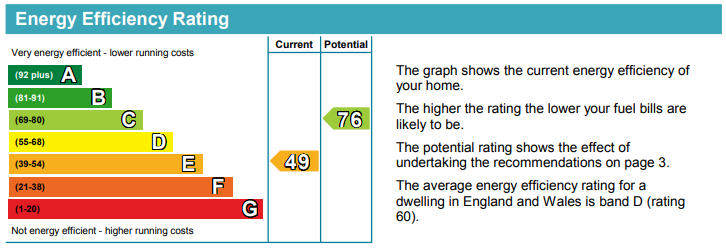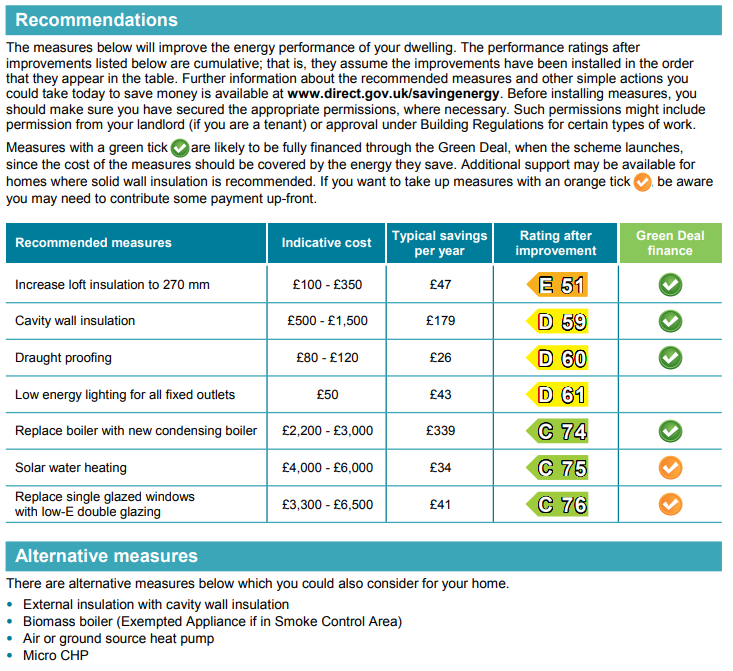Energy Performance Certificates, Explained.
Here at Home Made, we want to ensure that all our landlords (and tenants) are equipped with the know-how they need to make sure they are fully compliant with all relevant legislation. We recognise that decades of misinformation and poor regulatory enforcement have obscured the distinction between genuine legal obligation and the internal operating procedures of lettings agents. With that in mind, we’re publishing a series of guides explaining the what, why, and how of all the various compliance documents you need prior to the commencement of any tenancy at your property.
The first in our series of guides details everything you need to know about EPCs (Energy Performance Certificates). Though an EPC is a requirement for tenancies in all residential properties that aren’t listed buildings, many landlords either operate under the misconception that an EPC is only required for marketing purposes or are unfamiliar with what the document is and how they go about getting one.
What is an EPC?
An EPC is a document which provides a general overview of the energy efficiency of a property, the average annual cost of its utility bills, and a series of recommendations for remedial measures that may improve the property’s energy efficiency. Much like the multi-coloured energy labels on new appliances, properties are rated on a scale from A-G, with A being the most efficient.

The first page of the document details the overall energy efficiency grade of your property, its maximum potential grade, and a breakdown of the property’s estimated current and potential energy costs over a period of three years. On the second page, the certificate provides a detailed summary of the home’s energy performance related features (walls, roof, windows, boiler, etc). The third page provides a list of recommended and alternative measures that would improve the property’s energy efficiency, and information regarding the Green Deal scheme and how this might be utilised to help you finance the cost of any improvement. The final page contains basic details of the EPC assessment itself (the date of inspection, the name of the accredited inspector etc) and concludes with a note on the property’s environmental impact.
Click here for a link to the government's sample EPC document.
How do I get an EPC?
Energy performance assessments may only be carried out by an accredited assessor, and once a certificate has been issued it will be valid for 10 years. You can consult the EPC register to find an accredited assessor in your local area.
Why do I need an EPC?
It is a regulatory requirement that any property marketed for let must have a valid EPC at grade E or above. It is essential to commission an EPC prior to advertising a property for let (or for sale), and you must undertake every reasonable effort to acquire a valid certificate within the 28-day grace period permitted after your property has gone live on the market. All property listings must contain the first page of the EPC, and tenants must be provided with a copy of the certificate before the commencement of the tenancy.
Our proprietary research indicates that at least 50% of property listings on Rightmove do not show the correct EPC information even following the expiration of the marketing grace period. Such poor regulation within the traditional industry leaves landlords and tenants exposed and perpetuates uncertainty with regards to compliance.
There are also serious consequences for any landlord who fails to provide the correct EPC documentation to tenants prior to the commencement of a tenancy:
- A Section 21 notice to evict tenants from the property will be invalidated (even where an EPC was provided later).
- Fines of up to £5000 for renting a property without an EPC, or for renting a property that does not meet minimum energy efficiency standards.
- The relevant enforcement authority can ‘name and shame’ landlords by publishing details of the breach and any penalties imposed.
Additional uses of an EPC
While it might be tempting to file your EPC away in your records without any further thought if you’ve met the minimum required standard, we would encourage you to seriously consider the report in its entirety. In particular, the third page detailing recommended measures for improving the energy efficiency of your property and the likely costs and savings associated with their implementation.

The recommendations merit consideration as a higher EPC rating can be a real marketing asset for your property. As renting becomes the new norm for younger generations, tenants are increasingly sophisticated and are savvy enough to factor in the running costs of a property when choosing between multiple options. By undertaking some of the measures recommended by the EPC assessor, you could potentially make your property more attractive to prospective tenants and reduce your operating costs during periods of vacancy.
At Home Made, we operate with a compliance-first mentality to ensure that we are always safeguarding our clients’ best interests. If you’re looking to let your property in London and would like to work with a provider you can trust to keep you up-to-date with all the legislative requirements governing the lettings process, contact us today.
At Home Made, we offer a hybrid lettings solution that adds value at every stage of the rental process. With our game-changing new landlord platform, The Property Wallet, we offer London landlords exceptional tenant-find and property management services for a low monthly fee.
- Avoid expensive upfront fees and spread the cost of marketing your property with the option to pay monthly.
- Free rent collection and arrears chasing.
- Sign off and see all charges and payments in your dashboard.
- Real-time updates on marketing, viewings, and offers.
Prices start from just £50+VAT/mo for tenant-find and £60+VAT/mo for management. Alternatively, you can pay a one-off upfront fee of £1,200+VAT for our tenant-find service.
If you would like to speak with us about your property needs, contact us via our website to find out how we can help. If you're ready to get started, book your free valuation here.
Book valuationCheck out more of our landlord advice here and follow us on Twitter, Linkedin, and Instagram for regular updates on industry compliance standards, market insights, and Home Made company news.




